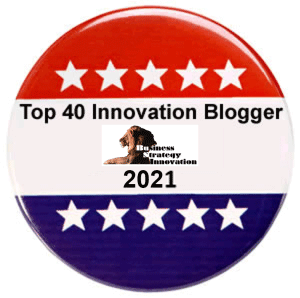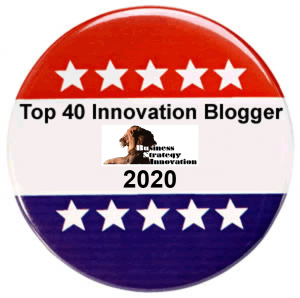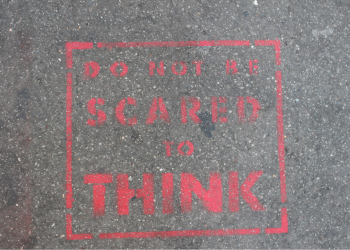In an HBR article “Why the Lean Start-Up Changes Everything”, Steve Blank describes a lean start-up as “favoring experimentation over elaborate planning, customer feedback over intuition, and iterative design over big design up front” developments. Residing in Israel, where there are currently more than 4,500 lean start-ups being developed by start-up entrepreneurs, who play the lean start-up way, I decided to explore this phenomena. Especially as to how it could be applied to creating a collaborative, entrepreneurial and intrapreneurial learning curriculum. Because learning to create, invent, innovate, collaborate and flourish by actively learning to play the lean start-up way is one of the keys to innovation success, whether you are a start-up entrepreneur or an innovative leader.
With innovation as a current buzzword, The Boston Consulting Group (BCG) reports in “The Most innovative Companies 2102” that 76% of their respondents rank innovation as a “top three” strategic priority – the highest level in the surveys history! That 85% of CEO’S ranked innovation as a top three priority, with almost 40% ranking it as the top priority, with a strong commitment to increase their investment in innovation.
The report also states that since the advent of the list in 2004, companies that have been on the list every year have delivered a 4% premium over 10 years, indicating that when companies become consistent innovators, they achieve longer term growth.
How does a company play the lean start-up way?
Some of the questions I asked included – how can they do this by maximizing the qualities of the Lean Start-Up to create a new entrepreneurial economy and how might they create value from understanding the generative nature of business problems and ideas? When researching the possible answers to some of these questions, I noticed that most company’s efforts were focused on installing idea generation and crowd based platforms as well as identifying mostly technology based process improvements. I also discovered that most innovation education was based around practical problem solving and idea generating techniques and tools, or upon a range of mostly formal consultant led interventions.
Which, to my mind, were very traditional and even conservative approaches to becoming consistent or lean innovators and would not deliver the desired or possible long term growth factors!
“You can’t solve problems with the same thinking (or mindset and behaviors) that created them!
With this as my mantra of I invested time towards understanding and identifying the unique attributes of the Israeli innovative eco-system, to explore how this systemic approach could be replicated and incorporated into a corporate learning environment. I also researched and codified the range of cultural drivers that drive it, to see if these could be inculcated into organizations as the basis for developing innovative cultures – as the development of an innovative culture is the basis for being a consistent innovator.
Ultimately, I researched, codified and replicated the intrinsic motivators, mindsets and behaviors into the Innovation Learning System. I integrated these concepts, principles and techniques with other cutting edge approaches to innovation management and emergence processes, including Otto Sharmer’s “Theory U” as a way of leading from the future as it emerges.
Innovation is a leadership responsibility!
Discarding most of what I already knew I also researched and explored a wide range of options, including enterprise gamification, to create a visceral, provocative and memorable learning experience, which ultimately became “The Start-Up Game™” a business simulation where people and teams acted as start-up entrepreneurs. To teach innovative and entrepreneurial leadership, through a two day business simulation, in the global corporate arena.
Adopting a generative, gamified and experiential approach
Utilizing my 30 plus years in designing customized corporate curriculum, I adopted a generative and experiential approach to learning that emphasizes “continuous experimentation and feedback in an ongoing examination of the way organizations go about solving problems”, which is very much aligned to the lean start-up way.
This also involves integrating the spiral of learning; by creating an initial and relevant experience that is debriefed to conclude and plan better ways of doing things next time.
As games are metaphors for what happens in real life, learning’s can also be applied and integrated at the individual, team or business levels.
Catering for differing learning and cultural styles
The concept of experiential learning incorporates the 4 styles developed by David Kolb;
Activist, Reflector, Theorist and Pragmatist.
These factors all influenced the sphere of adult learning and became the basis for designing and developing the majority of corporate education programs since the early 1990’s. Additionally, consideration was taken around the role and impact of cultural differences and inclinations in learning program design.
Making learning sensory specific and neurologically adept
It was also important to integrate the key sensory factors involved in learning, to make the learning program sufficiently ‘sensory specific’ to all types of individual processing and preferences; visual, auditory, kinaesthetic and audio digital. The intent was to stimulate peoples neurological processing and preferences for acquiring and accessing information, through a broad and diverse range of visual, auditory and active techniques based stimuli.
Neuro-psychological research into learning suggests that Sensation Seeking provides a core biological drive of curiosity, learning and exploration. A high drive to explore leads to dysfunctional learning consequences unless cognition’s such as goal orientation, conscientiousness, deep learning and emotional intelligence re-express it in more complex ways to achieve functional outcomes such as high work performance.
Entrepreneurial innovation as a learning system
In 2011, Robert M. Gemmell surveyed 172 technology entrepreneurs to explore links between learning style and learning flexibility and decision making behaviours hypothesized to produce entrepreneurial innovation and success. His study confirms the “profound role of experimental practices” within a learning system for innovation, suggesting that “an overwhelmingly large portion of innovation performance achieved by our entrepreneurs (52%) can be explained by their hands on, iterative approach to learning and problem solving.”
Gemmell concluded that “entrepreneurs are most innovative when they utilize experimentation as a key practice without ignoring the other learning processes. Entrepreneurs will be more successful and innovative when they take time to reflect upon multiple alternatives and when they test trial ideas socially before making important decision.”
Acting as start-up entrepreneurs
So, The Start-Up Game™ was born, a co-creation between ImagineNation and The Playful Shark, two Israeli Start-Ups, as a two day business simulation, where people and teams act as start-up entrepreneurs, to develop intrapreneurial and entrepreneurial leadership capability.
It develops a culture of experimentation and collaboration, which is an intrapreneurial and entrepreneurial way of thinking, doing and be-ing resulting in consistent innovation, and playing as start-up entrepreneurs, the lean start-up way!
At ImagineNation™ we provide innovation coaching, education and culture consulting to help businesses achieve their innovation goals. Because we have done most of the learning and actioning of new hybrid mindsets, behaviors and skill-sets already, we can help your businesses also do this by opening people up to their innovation potential.
Contact us now at janet@imaginenation.com.au to find out how we can partner with you to learn, adapt and grow your business in the digital age.











